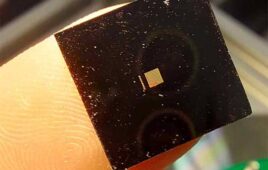
[Image from University of Minnesota]
The lab-engineered blood vessel replacement is the first non synthetic, decellularized graft that is repopulated with cells using the recipients cells when implanted. The grafts could also be used as coronary and peripheral bypass blood vessel and tubular heart valves.
Approximately 480,000 people are on dialysis in the U.S., according to the National Institute of Diabetes and Digestive and Kidney Diseases. An arteriovenous fistula that connects an artery to a vein in the arm is typically how blood vessels are accessed for hemodialysis, but 30-50% of patients have complications and end up needing to connect the vein and artery using an arteriovenous graft, which is an artificial tube.
The arteriovenous grafts are created using synthetic materials that are typically prone to clotting, infection and other complications. Lab-grown grafts made from cells and biological materials could result in fewer adverse reactions. However, the living tissues are unable to be stored for long periods of time and could create an immune response if the patient’s own cells aren’t used. Because of this, getting the artificial graft to commercialization and clinical use is a difficult process.
University of Minnesota researchers created vessel-like tubes in a lab in a pre-clinical study. The tubes were made from post-natal human skin cells that were embedded in a material made from cow fibrin that is a protein that helps with blood clotting. The gel-like material was placed in a bioreactor and was able to grow for seven weeks. The researchers then washed away the cells in its final week and what they were left with was collagen and other proteins secreted by the cells, or an all-natural, non-living tube that could be implanted.
“We harnessed the body’s normal wound-healing system in this process by starting with skin cells in a fibrin gel, which is Nature’s starting point for healing,” Robert Tranquillo, University of Minnesota department of biomedical engineering professor and leader of the study, said in a press release. “Washing away the cells in the final step reduces the chance of rejection. This also means the vessel can be stored and implanted when they are needed because they are no longer a living material. In the future, thousands of the lab-grown vessels could be made from a small skin biopsy from one donor and then stored on the shelf for when they are needed by patients.”
The researchers tested the vessel by implanting 15 cm long lab-grown grafts into adult baboons. Six months after the tubes were implanted, the grafts started to look like blood vessels and the healthy cells were populating the walls of the tubes. According to the researchers, none of the grafts calcified and one one of them ruptured from mechanical damage with handling. They also reported that after six months, the grafts could handle 30 times the average human blood pressure without rupturing. They also had no immune response and could receive repeated needle punctures by self-healing.
“This pre-clinical trial was extremely important to us,” Tranquillo said. “In previous studies, we implanted vessels in sheep, but we needed to test them in a more human-like model before risking human lives because the success of our material depends not he ability of the recipient to recellularize it into a living tissue without immune response, which might have failed in a human even though it succeeded in a sheep.”
Tranquillo and the researchers hope to receive FDA approval to test the blood vessel replacement in children with pediatric heart defects.
The research was published in the Science Translational Medicine journal and was funded by a private grant from the John and Nancy Lindahl Children’s Heart Research Innovators Fund and the University of Minnesota Center for Translational Medicine.




